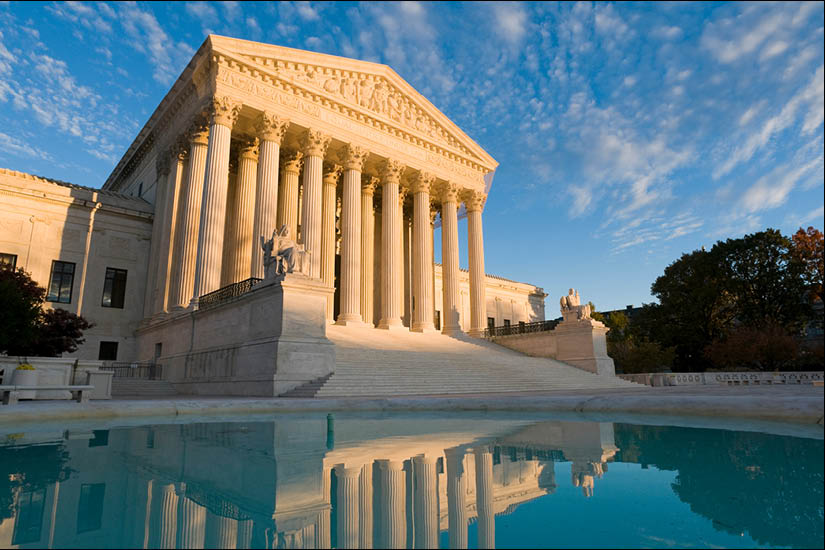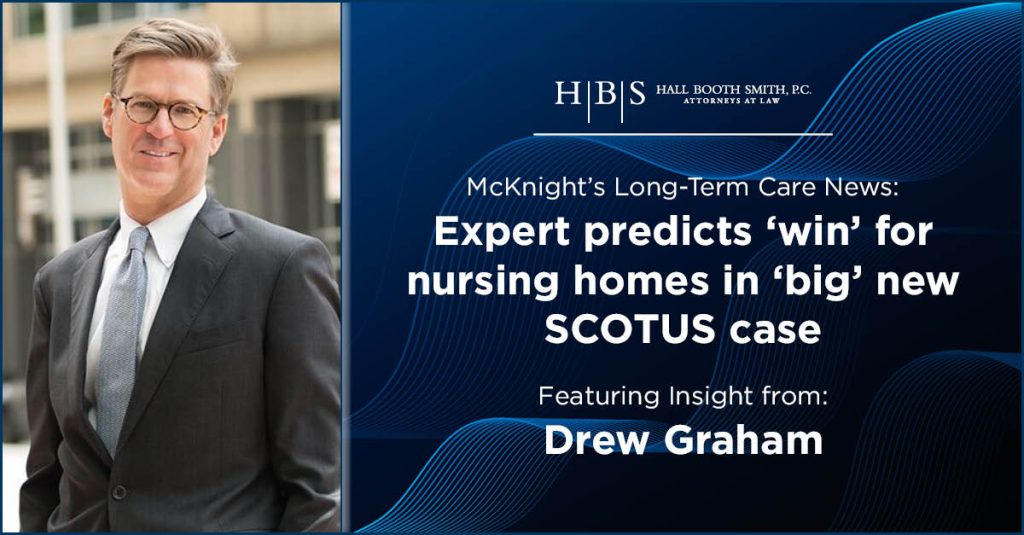
McKnight’s Long-Term Care News: Drew Graham on Nursing Home “Win” from SCOTUS Case

The Supreme Court of the United States on Monday said it will review a ruling that revived an injury lawsuit against a state-owned nursing home.
The case has wide-reaching implications for providers. It could add a new right for private lawsuits of action as a component of the federal Nursing Home Reform Act (NHRA) depending on the future ruling, legal experts warned.
“This is a big deal,” Angela M. Rinehart, an attorney with Katz Korin Cunningham, told McKnight’s Long-Term Care News on Monday. “This is not the typical case that the Supreme Court would take up. It is significant for a few reasons.”
Case Background
The original case was filed in 2019 in federal court by the family of a former nursing home resident, Gorgi Talevski, against the Health and Hospital Corporation of Marion County in Indiana, which owns Valparaiso Care and Rehabilitation in Indiana. Talevski was a dementia resident who lived at the facility.
Talevski’s family alleged that the facility failed to comply with the NHRA by administering “unnecessary” psychotropic medications, which caused his physical and cognitive condition to rapidly decline. They also alleged the drugs were given to move Talevski from the facility without the consent of his family.
The provider has denied the family’s claims and alleged that Talevski was repeatedly violent and sexually aggressive toward staff and female residents, and his doctor prescribed the medications to improve his behavior.
An Indiana district court dismissed the original lawsuit in 2020. It ruled that though the NHRA establishes federal standards of care, it does not allow private lawsuits (those that don’t involve the U.S. government) against government-funded facilities.
The U.S. Court of Appeals for the Seventh Circuit last July reversed that decision, reviving the lawsuit. That decision was appealed by the provider to the Supreme Court.
Rinehart explained that under the Seventh Circuit’s ruling, a plaintiff can bring a suit under section 1983 of the NHRA for an alleged violation of residents’ rights. Prior to that, the only other option was to file a claim for negligence or medical malpractice under state law. Several states have limited damages through tort reform or other capping mechanisms, sometimes making a federal avenue attractive to plaintiffs’ attorneys.
“If the Supreme Court affirms the Seventh Circuit ruling in this case, this provides a new cause of action [and] a new avenue for recovery outside of any statutory damage caps, for plaintiffs bringing suit against nursing homes in the Seventh Circuit — specifically in Indiana where the facility that is party to the lawsuit is located,” Rinehart said.
The core legal issue in this type of case is whether the text and structure of a statute indicates that Congress clearly intended to create new individual rights in favor of residents, said Mark E. Reagan, the managing shareholder of Hooper, Lundy & Bookman, P.C.
“One of the most prominent elements in this analysis is whether Congress provided for a private right of action or utilized language that would arguably provide for at least an implied right of action,” Reagan told McKnight’s Monday.
“It did neither under the Nursing Home Reform Act. Although the act prominently includes ‘resident rights’ that the facility must honor, there is nothing in its text or structure that would appear to enable residents to enforce such rights,” he added.
Major implications
Allowing certain individuals to bring lawsuits based on alleged noncompliance with the Requirements of Participation would have a huge impact on some providers — both positive and negative, according to Drew Graham, an attorney with Hall Booth Smith, P.C.
“On the one hand, private enforcement would create confusion in the law for providers, regulators, residents, and courts. This is because under the Medicare statute and regulations, both the services and enforcement components of the FNHRA prescribe standards of conduct different from state standards of care applicable to healthcare providers now,” Graham told McKnight’s Monday. “Competing standards of care would cause immediate confusion.”
For years, however, claims brought by families have alleged violations of the requirements and Medicare statutes through indirect claims in state courts — such as allegations of negligence under state law, Graham said.
“So far, federal courts have not recognized a direct claim under (federal conditions). Allowing a direct claim would open the door for nursing home cases alleging improper care to be heard in federal court rather than state court,” Graham said. “This could, over time, lead to legal clarity and uniformity across the country.”
Rinehart noted the case specifically covers government-owned nursing homes, including the many in Indiana owned by county government agencies but run by outside operators.
‘The implication of this is that these lawsuits allow for substantial financial awards, including attorney fees,” she added.
SCOTUS Ruling
Rinehart believes that there will be a push to provide a clear ruling on the matter given the number of conservative members on SCOTUS.
“Parties have attempted to bring this very issue to the Supreme Court previously. Most recently, Justices Alito, Gorsuch and Thomas voted to take up a similar case in 2018, which was not successful,” Rinehart said. “Given the current posture of the case, I predict that the more conservative justices will vote to overturn the Seventh Circuit’s ruling and find that there is no private right of action under section 1983.”
That would be a “win for the nursing home industry,” she said.
“Given such a ruling, lawsuits alleging over-administration of medications and various violations related to care and treatment will continue to be brought via negligence/malpractice actions,” Rinehart said.
Reagan added that he expects SCOTUS to overrule the Seventh Circuit and “put this issue to rest.”
“This would mean that public entities operating long-term care facilities could not be sued for Section 1983 claims, which provide for damages as well as attorney fee awards,” Reagan said.
“If it does not overrule the Seventh Circuit, Section 1983 would be usable against public entities operating long-term care facilities but not their private counterparts,” he said. “The risk to private entities under that scenario would be that there would be language in an opinion upholding the Seventh Circuit decision that could be usable in some other way to leverage state court civil liability claims against those types of entities.”
Currently, skilled nursing facilities are not subject to lawsuits based solely on alleged violations of the NHRA and the associated regulations, according to Graham. He believes “if the SCOTUS strikes the Seventh Circuit’s ruling, the law will not substantively change for most providers.”
Source: McKnights Long-Term Care News


Leave a comment
You must be logged in to post a comment.